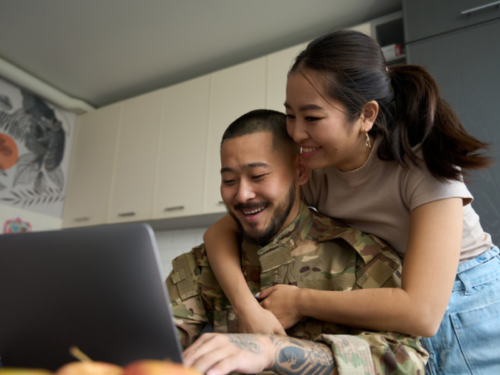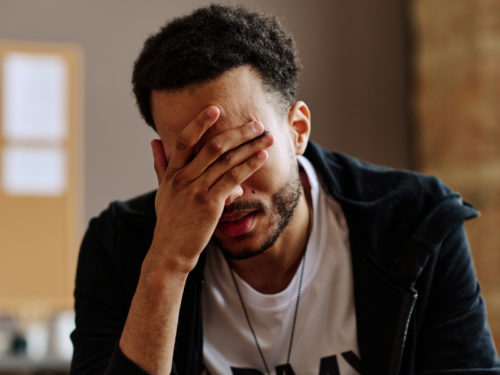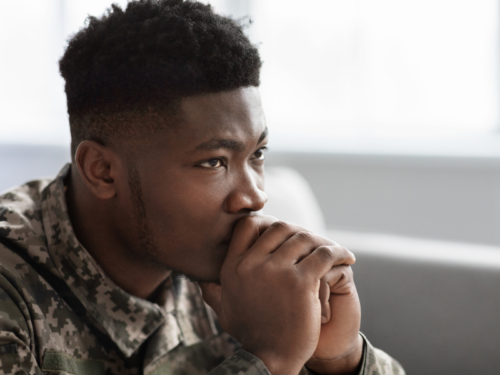
Table of Contents
Charlie Health Military Program Reviews From Veterans (and Military Family Members)
Written By: Charlie Health Editorial Team

Clinically Reviewed By: Dr. Don Gasparini
Updated: April 8, 2024
4 min.
Hear from veterans and military family members who managed their mental health with Charlie Health’s virtual Intensive Outpatient Program (IOP).
Learn more about our Clinical Review Process
Table of Contents
Trigger warning: Suicide. If you’re experiencing suicidal thoughts and think you’re in danger of harming yourself, this is a mental health emergency. In this case, you should contact The National Suicide Prevention Lifeline by calling or texting 988.
Being a United States service member or part of a military family poses unique mental health challenges. About one in three veterans seeking healthcare are concurrently battling depression and anxiety, and families of deployed service members face more mental health challenges than those without an active duty family member. Frequent relocations and financial strain can also make it harder for military families to access mental healthcare.
Charlie Health is working to reduce the mental healthcare barriers faced by military families. Our virtual Intensive Outpatient Program (IOP) offers convenient scheduling, partners with military insurance plans (like Tricare East and West), and employs clinicians with military cultural competency. To learn more, we polled several Charlie Health clients (all of whom served in the military or have an immediate family member who did) about their experience receiving care with our virtual IOP. Keep reading for Charlie Health military program reviews from those Charlie Health clients who completed our treatment.

Virtual care personalized to you
Groups with veterans and military family members led by clinicians with military cultural competency.
David T.’s mental health journey
“After graduating from West Point, I was commissioned as a human resources officer in the army. Right as I was starting that job, my younger brother committed suicide.
It was a very difficult time for me and my family. When leadership became aware of all the personal issues I was struggling with, they encouraged me to go to therapy but weren’t willing to take things off my plate to make it possible. I was pretty regularly working 12-hour days. The encouragement was there, but the follow-through was not. This is a systemic problem with the way the military approaches mental health. There’s a lot of pressure to get people, including people with mental health diagnoses, fit for duty ASAP, so there’s really not a good long-term support system.
Your health comes first, and if that means sacrificing an army career, it’s better to address it and get the help you need rather than carry it down the road and not deal with it. I didn’t get the support I needed, and then nearly 10 years later, I ended up in inpatient. That’s part of the trauma I worked through at Charlie Health. The combination of encouragement from group members and the trauma processing in individual therapy helped me get to a much better point in my recovery journey.”
—David T., 30
Destiny A.’s mental health journey
“I joined the military as a teenager and was assaulted by another soldier. Afterward, I was discharged very suddenly and didn’t get a chance to file a report. I didn’t even get my GI bill or any VA help.
When I joined Charlie Health, I was at a very low point. I’d tried different therapy options on and off, but nothing stuck. Charlie Health probably saved my life. The group was very impactful. It’s the common support and common ground that we all have. Even if we don’t all have the same traumas, we may have gone through something similar and have advice for each other. I think it’s a beautiful thing.
My time in the military still makes me angry, but it’s not earth-shattering anger anymore. I’ve learned to forgive myself and remind myself that the sexual assault is not my fault. It was entirely on this man and entirely on the military. Trauma is deeply ingrained. It’s hard to work through it, and as hard as it is, it’s worth it.”
—Destiny A., 25
Victoria L.’s mental health journey
“My older sister is in the military. She did ROTC in college, and now she’s in the Navy. My sister’s my best friend, and it’s been hard to have her gone during this time.
At the start of college last year, I was having a really hard time. I ended up having to go to the hospital, and that’s when Charlie Health was recommended to me. I’d never done group sessions, so I was really nervous, but it ended up being very comforting to hear other people’s stories.
Charlie Health has helped me with my relationships. Before treatment, I was not in a very good relationship with my significant other. After treatment, I met up with my ex, and he said he wanted to get back together, but I told him I didn’t trust him in the way I needed for a relationship. I never expected myself to be able to stick up for myself, and it definitely showed how much I changed through Charlie Health.”
—Victoria L., 19
Mental health treatment for military families at Charlie Health
If you or a young person in your life is struggling with military-related mental health challenges, Charlie Health is here to help. Charlie Health’s virtual Intensive Outpatient Program (IOP) provides more than once-weekly mental health treatment for teens, young adults, and families dealing with serious mental health conditions, including those related to military service. Our expert clinicians incorporate evidence-based therapies into individual counseling, family therapy, and group sessions. With this kind of holistic, personalized treatment plan, managing your mental health condition is possible. Fill out the form below or give us a call to start healing today.





